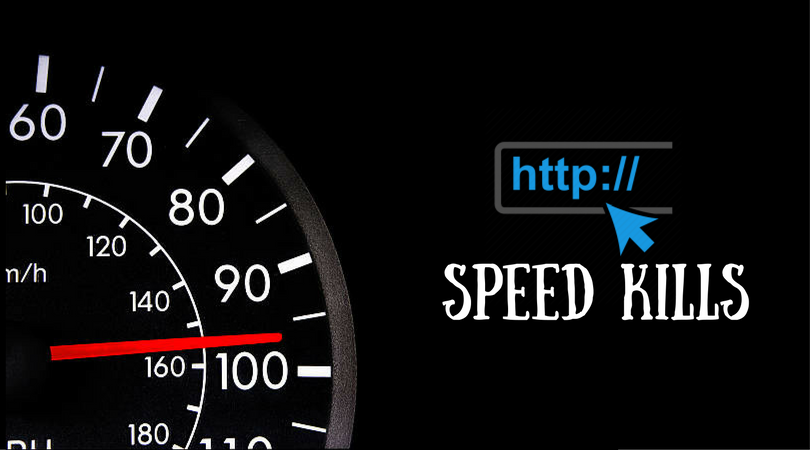It Matters Today More Than Ever
An online presence is required for almost all companies to survive, from mom-and-pops to big businesses. 92% of the small business without a website in 2017 said they plan to have one by the end of 2018. Now, whether you already have a website or plan to have one in the near future, it is more important than ever to focus on speed. There are three main reasons why speed is such a big deal today and those are Facebook, Google, and ultimately, Conversions. Don’t worry though, testing your site’s speed is easy and this will provide tips on how you can decrease your pages load time.
In early August Facebook announced that their algorithm is now favoring posts that link to fast-loading web pages. Research from Facebook showed that as many as 40% of website visitors will abandon a site after 3 seconds if there is a delay. This platform is a huge chunk of the online marketing sphere which means you should care about pleasing its algorithm.
Google could almost be considered the core of the internet. It’s where people go to find products, services, and brands that fit their needs, and where brands go to advertise. But, whether your using AdWords or just hoping you’ll show up in the search speed is again, a must. Have you ever heard of Accelerated Mobile Pages (AMP)? Well, David Besbris, Google’s Vice President of Engineering for Search says, “AMP is a requirement”.
Google says that AMP pages will load almost 4 times faster. “There’s a shift between really fast to instant”, Besbris said. When a consumer does a search on their phones, the AMP version will always be the one that loads. I guess speed really can kill.
Conversions
Believe it or not, speed can also affect your sales. And, that’s what really matters right? Nearly half of web users expect a site to load in 2 seconds or less. What do they do if it doesn’t load in that time? They leave. 79% of shoppers won’t return to a site if it didn’t load the first time and 44% of them would tell a friend that they had a poor experience.
Test Your Website Speed
Testing your website speed is easy and here are two free tools you can use to do so. Both tools are practically the same. All you have to do is enter your website’s URL. You can do this on Pingdom or on Google.
Is your site loading fine? Perfect!
If not, check out the tips below. Some of them are easy enough to do yourself; however, some may require a web developer. If you feel uncertain about anything, ask for help, because something could go wrong quick. But, don’t let that stop you from optimizing for speed because it is extremely important today.
Speed Up Your Site:
Condense
An HTTP request is made for all of the components on a website including images, style sheets, scripts, flash, etc. The quickest way to improve site speed is to simplify. Go through and decide if there are pages you can eliminate or combine together. Take a look at all the images on your site and if they don’t add value than they don’t need to be there. For the images you decide to keep, you can reduce their size without losing quality with a number of online tools like Imagify. Also, if you size the images correctly before uploading them to your website than this reduces the work your site has to do.
Update
You should be updating your website theme, plugin, and core regularly. It is also important to keep in mind that too many plugins can weigh down a site. Reducing the number of plugins can help speed up your website. You can selectively turn off plugins in order to test and identify which plugins are affecting your site’s speed.
Optimize for mobile
This could be one of the most important factors for a website today as most web browsing takes place on a mobile device. If your site is not optimized for mobile than it takes much longer to load your website on a mobile device. If you don’t know if your website is mobile friendly or not you can take Google’s Mobile-Friendly Test. Since web speed is so crucial to Google, it would make sense to take mobile optimization advice from them directly. Click here to read about how to go mobile.
Enable Browser caching
This makes it so when someone returns to your website it is already queued up in the cache rather than reloading the entire page. Word Press makes it easy by offering a web browser caching plugin. The Word Press W3 Total Cache plugin also comes with GZip Compression which can reduce the size of browser-based HTTP request by as much as 70%. There are a few different ways to turn on Gzip compression. Find the best way for your site here.
Make sure your Web host isn’t the problem
Sometimes the sole reason for a slow website has nothing to do with you at all. When it comes to web host providers, cheaper is not always better. Make sure that your host uses up to date and industry standard technology and backed by a technical support team.
Of course, this blog is trying to shed light on things you might not have considered or known go into your website speed, it is not a step by step guide of how to implement these fixes. If you are looking for step by step instructions on any of the above recommendations there are a number of places to go online to help you out or simply mention any of these to your developer and they should be able to take care of you.
Interested in reading more stories like this? Stay up to date with the digital marketing world and sign up for our weekly newsletter!




